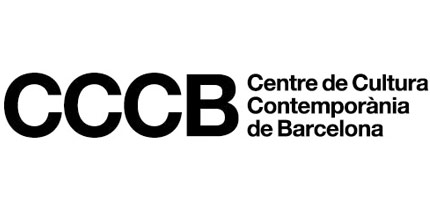AI: Artificial Intelligence
The Infinite Talk
Experiments with the CCCB Archive
Free
An artistic installation by the Estampa collective that plays with the possibilities of artificial intelligence. Every day for a month, an artificial intelligence model trained with the content of the CCCB’s archive compulsively writes a talk for eleven hours uninterrupted.
You can follow it on the CCCB’s website and in the Pati de les Dones courtyard on a 32-metre screen that reproduces the text generated by the artificial intelligence model. The installation is activated every morning by a title suggested by a thinker, scientist or creator with the aim of provoking reflection on the issues that will concern us for the next 30 years.
«The Infinite Talk» uses a text generation network trained with some 2,300 videos and audios from the CCCB’s archive of debates and talks. Over the course of 30 years, the talks at the CCCB have addressed multiple issues with all manner of voices, coming to form an extensive cartography of the reflections, concerns and discoveries of contemporaneity.
The installation of the Estampa artistic collective uses this body of text to propose an experiment with AI and its uses. What value do we give it? How are we to understand it? What possibilities does it offer? What does AI do with everything it swallows up? The experiment sets out to highlight the strong points and limitations of statistical writing when exploring singular archives.
«The Infinite Talk» will be active for a month. Every day, AI writes compulsively and nonstop a talk that it generates, drawing on the themes and statements proposed by the 30 authors, trying to imitate the CCCB’s archive.
List of authors and titles of their proposals
The talk imagined by each author and artificially generated by the machine will take place on the day indicated:
- 24/02 | Marina Garcés. Disobeying the apocalypse. Ten reasons to fight fear of the future.
- 25/02 | Rosa Rius. The past that doesn't get old. Machiavelli, Zambrano, Weil, cultivating attention.
- 26/02 | Gemma Barricarte. Post-fossil utopias. Decarbonizing desire or about who we could be in a world without fossil combustion.
- 27/02 | Miquel Missé. Mikado future: subjectivities and uncertainty. 2054. What will structure subjects if the structures that guide life continue to be dismantled?
- 28/02 | Juan Pablo Villalobos. Language and literature out of place. New forms of non-adaptation to the hegemonic discourses of power, identity, technology and market.
- 29/02 | Begonya Saez. Networks in emergency. Care policies for a connected future (subjects, settings and affections).
- 01/03 | Alexandra Laudo. A world without night, humans without sleep. Of the extinction of darkness and sleep in the age of 24/7.
- 02/03 | Lucía Lijtmaer. Where is intimacy? How should culture and thought address the notion of intimacy in the 21st century.
- 03/03 | Maria Ptqk. Can a forest have rights? The extension of legal personality to ecosystems opens up the concept of justice to a world not dominated by the omnipotence of human beings.
- 04/03 | Xisi Sofia Ye Chen. No words, no silence. Letting go of intelligence.
- 05/03 | Lluís Nacenta. What languages does a cyborg society speak? Concordances, translations and misunderstandings between computer languages and human languages.
- 06/03 | Anyely Marín Cisneros. The slave archive dismantled. History lessons to deracialize the eyes.
- 07/03 | David Bravo. The Barcelona of greenwashing. Contradictions of an urban model that uses ecology to attack the planet.
- 08/03 | Laia Abril. Deepfake and artificial intelligence: digital misogyny. Analyzing the new tools of cyberbullying and their impact.
- 09/03 | Clara Roquet. The importance of artistic creation in a world in crisis. The challenges of the future of artistic creation in the face of social emergency and climate change.
- 10/03 | Mafe Moscoso. We die, we die, we return. Songs, tribulations and discoveries of a joyous equinoctial cosmogeological scientific radiance.
- 11/03 | Carlota Subirós. Presence and encouragement. A call for hope, tenacious purpose and committed action.
- 12/03 | Jordi Martínez-Vilalta. The human being and nature: between emotion and calculation. Or why it is urgent to learn to dance with ecosystems.
- 13/03 | Xènia Dyakonova. Non-mandatory reading. Can we be influenced by books we haven't read?
- 14/03 | Joana Moll. Holes everywhere. The physical limits of artificial intelligence.
- 15/03 | Blanca Arias. A phantom is not a metaphor. Looking for traces of future in the past and other survival mechanisms.
- 16/03 | Gerard Ortín. The fourth agri-food system. Technologies, ecologies and food production sovereignty.
- 17/03 | Borja Bagunyà. The crisis of attachment in the age of enjoyment. New identities for new alterities.
- 18/03 | Mohamad Bitari. The labyrinth. Eight rounds in the forest of translation.
- 19/03 | Gemma Ferreón. Collective strategies for surviving colonialism. Resistances and alliances of global souths in the face of genocide, terricide and extractivism.
- 20/03 | Georgina Surià. "I would prefer not to" or "Nothing can be done". The end of art, the beginning of fun. Seven strategies for the use of time for when machines take our jobs.
- 21/03 | Miquel Sureda. From Earth to Mars, with a stopover on the Moon. The coming decades will mark the beginning of our expansion through the solar system. Can we do it in an ethical and sustainable way?
- 22/03 | Clara Serra. The risks we're prepared to continue running. Do reactionary forces feed on stirring up our fears? What meanings does our society give to the notion of "security" today? What if the worst of all dangers was to stop taking some risks?
- 23/03 | Àlex Hinojo. Those who don't go there... are the ones who need it most. Who's afraid of the CCCB? The challenges of spreading knowledge among those who think they don't need it.
- 24/03 | Mireia Calafell. One more goodbye. From the inevitable gesture of never again to farewell as a welcome.
How was «The Infinite Talk» created?
To make «The Infinite Talk» work, the Estampa artistic collective has trained a text generation network with the transcription of talks from the CCCB archive. These networks are statistical imitation systems that, provided with a series of examples, look for probable solutions to generate other, similar ones. What a model generates always echoes the training dataset. Topics, themes, semantics, expressions... are all mixed by a combinatorial tool that consolidates the training data, but can also give rise to unexpected twists.
Unlike the big AI models currently being developed, such as Chat GPT, Estampa’s project is designed as a concrete, specific model—to imitate the Centre’s archive–and has been developed using high-performance hardware that is accessible at user level. This way of working responds to reflections on the need for a clearly outlined use of these tools, not only to reflect on what we want to do with them, but, first and foremost, for reasons of ecological expenditure. It is also the product of an interest in the results of smaller models, which, trained on small bodies of data, are more prone to unlikely combinations. Large models mimic the average and produce standard results; small models force combinatorics and, if we are lucky, new ideas appear.
Participants: Estampa, Marina Garcés, Rosa Rius Gatell, Gemma Barricarte, Miquel Missé, Juan Pablo Villalobos, Begonya Saez Tajafuerce, Lucía Lijtmaer, Maria Ptqk, Xisi Sofia Ye Chen, Lluís Nacenta, Anyely Marín Cisneros, David Bravo, Laia Abril, Clara Roquet, Mafe Moscoso, Carlota Subirós, Xènia Dyakonova, Joana Moll, blanca arias, Gerard Ortín Castellví, Borja Bagunyà, Mohamad Bitari, Gemma Ferreón, Miquel Sureda, Clara Serra, Àlex Hinojo, Mireia Calafell, Alexandra Laudo, Jordi Martínez Vilalta,
This activity is part of AI: Artificial Intelligence, Question Time and The Infinite Talk
Related contents
Could a Forest Be the Subject of Rights?
Maria Ptqk
The idea of conferring legal personhood on ecosystems offers the possibility of justice in a world no longer dominated by human omnipotence.
Reflex Actions. Generative AI Tools and the Archive
Estampa
When we train an AI with the dataset created from an archive, new questions and ways to analyse its content emerge.






